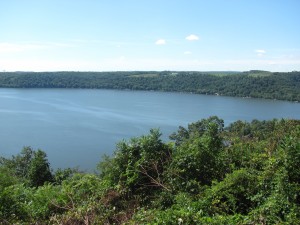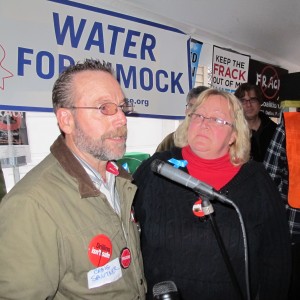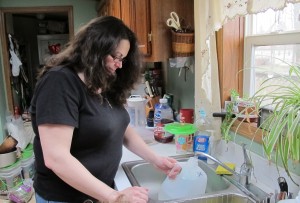Critics say EPA fracking study offers little to advance public debate
-
Jon Hurdle

Scott LaMar/WITF
The EPA report looked into whether fracking affected the quality of drinking water sources such as the Susquehanna River
The U.S. Environmental Protection Agency’s long-awaited report on fracking and drinking water is short on new research, and avoids discussing some high-profile cases where gas development is alleged to have contaminated water, analysts said.
The report, issued on June 4, some four years after the EPA began its investigation, was immediately hailed by both the energy industry and its opponents in the anti-fracking movement as justifying their highly polarized positions on whether hydraulic fracturing threatens the safety of public drinking-water supplies.
But the document disappointed some academic observers who said they had hoped for fresh field studies that would shed new light on the long-contested questions of whether fracking contaminates water with the toxic chemicals used to help harvest gas from shale deposits, leaks waste water into surface sources, or liberates poisonous elements from deep within the earth.
“I think the EPA is treading pretty lightly on this subject,” said Frank Dorman, an associate professor of biochemistry at Penn State University, who co-authored a recent paper on water contamination related to fracking in Bradford County, PA. “I look at this as much ado about nothing.”

Susan Phillips / StateImpactPA
Craig and Julie Sautner became outspoken critics of the gas industry after Cabot Oil and Gas began drilling in Susquehanna County. The Sautners say drilling contaminated their water and after protracted legal battles with the company the couple has since moved away.
Dorman said that it’s hard to explain why the agency would spend more than 1,000 pages synthesizing existing literature unless it wanted to avoid suggestions that water quality is threatened by an energy source that is a cornerstone of Obama administration policy.
“I can only guess it’s because of the amount of money that’s moving around because of this,” he said. “They seem to be very reluctant to more fully engage. It has to be politically motivated.”
In the absence of new information, both sides will become more entrenched, Dorman said. “We are working in a real information vacuum, and that allows the conspiracy theorists to thrive.”
EPA officials were not immediately available to respond to the criticisms.
Rob Jackson, Professor of Earth System Science at Stanford University, said he too had hoped for more monitoring in the field before, during and after drilling, as stated in the EPA’s draft plan.
Instead, the document contains “something for everyone” with its conclusion that there is no widespread evidence that fracking impacts U.S. drinking water sources, while noting “specific instances” of impacts on water, including drinking water wells, Jackson said.

Susan Phillips/ StateImpact Pennsylvania
Kim McEvoy says after gas drilling began in her township in Butler County, her water has never been the same. She gave up living in her house to move to an area with a municipal water supply.
While pro-fracking partisans welcomed the paper’s main conclusion that there were no systemic impacts, it also goes some way to fueling critics’ claims, Jackson said.
“The take-home message is that everything is OK but when you dig into the document, there are quite a few things that people should be concerned about,” he said.
Among them is the report’s revelation that fracking goes directly into drinking water sources in three-quarters of cases studied in five states, he said.
Still, there’s no evidence in the report of the severe contamination claimed by some critics, Jackson said, noting that the study was never intended to examine the health consequences of fracking and drinking water.
“We’re not seeing instances of entire aquifers destroyed,” he said. ‘I’ve never seen an instance of a town or a city that’s had to find another water supply because fracking ruined their aquifer.”
Jackson speculated that the EPA pulled its punches because of political pressure from the industry and the administration.
“I think they are gun shy,” he said. “I think they fear the industry. I also think they are under pressure from the administration not to stir up too many problems because it’s the Obama administration’s chosen pillar of fossil-fuel choice. The Obama administration stakes a lot on natural gas, and naturally the EPA is under a tight rein to keep to the party line.”

www.nj.gov/drbc/
Carol Collier, former executive director of the Delaware River Basin Commission, says she’s disappointed in the EPA’s study.nj.gov/drbc/
Carol Collier, a senior water advisor at the Academy of Natural Sciences of Drexel University in Philadelphia, said she was disappointed by the EPA’s lack of fresh data on water conditions before and after fracking; by its shortage of toxicological research into some of the substances associated with fracking, and by the report’s failure to consider the effect on water of future oil and gas development.
“They admit that this did not cover future development scenarios,” she said. “That is something we really need to do if we’re going to get a real risk and cumulative impact assessment.”
Collier is a former executive director of the Delaware River Basin Commission, which under her watch drafted new gas drilling regulations for the watershed. The DRBC maintains a de facto moratorium on drilling in several Pennsylvania counties while its attempts to implement the new rules have stalled.
The report also lacked a risk assessment across multiple pathways, which Collier said is needed especially in Pennsylvania, and would have benefited from an examination of the industry’s effect on ecology as well as its human impacts.
More new information would have helped policymakers make credible rules for the industry, said Collier.
“It’s possible to really have production of shale gas but it’s really important that we have appropriate regulations,” she said.
But even the absence of fresh information has some value because it highlights how much more work is needed on the effects of fracking, Collier said.
“It advances [the discussion] in some ways by exposing how little information we still have, and how much more we need,” she said.
Correction: An earlier version of this story incorrectly stated that the EPA report did not include the results of field studies in five locations, including two in Pennsylvania. The field studies were, in fact, included alongside the main report.
















